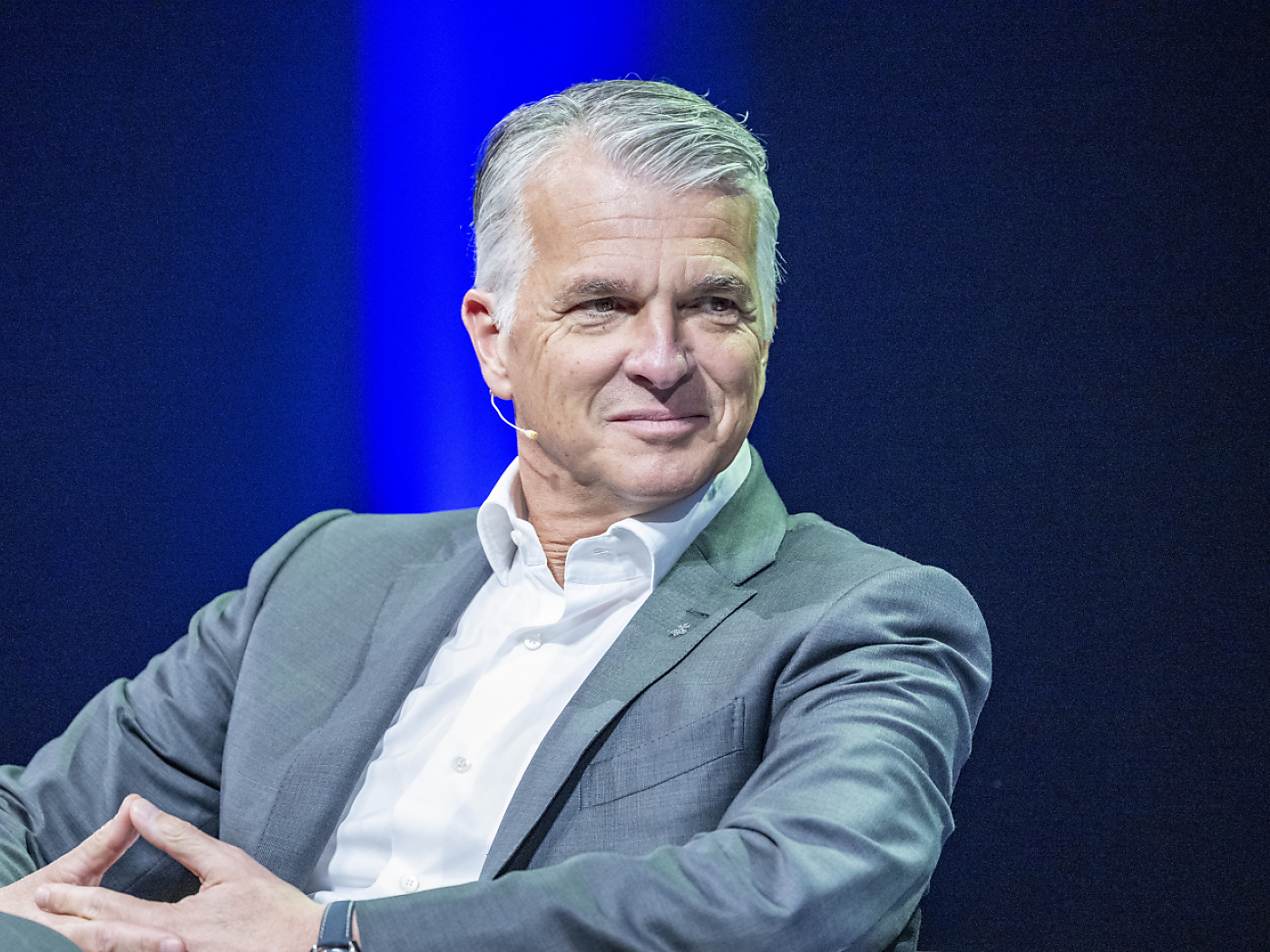
Wall Street Has Best Day Since April on Fed Signal: Markets Wrap
(Bloomberg) — A decisive move toward dovishness by Federal Reserve Chair Jerome Powell all but cemented bets on an imminent interest-rate cut, driving stocks and bonds sharply higher at the end of a volatile week.
Powell’s speech sparked the strongest cross-asset rally since April, with major ETFs tracking equities, Treasuries, credit and cryptocurrencies all rising at an average pace of 1.3%. Economically sensitive shares powered the rebound in S&P 500, which climbed 1.7%. A gauge of tech megacaps jumped 2.2% while the Russell 2000 soared 4%. Bank stocks headed for a record high.
Subscribe to the Stock Movers Podcast on Apple, Spotify and other Podcast Platforms.
Treasury two-year yields, which are more sensitive to imminent Fed moves, sank 12 basis points to 3.68%. Traders boosted bets on a rate cut next month, pricing in an 85% chance of a move. A dollar gauge slid about 1%.
“The stability of the unemployment rate and other labor market measures allows us to proceed carefully as we consider changes to our policy stance,” Powell said Friday. “Nonetheless, with policy in restrictive territory, the baseline outlook and the shifting balance of risks may warrant adjusting our policy stance.”
Powell’s remarks offered the reassurance investors had been waiting for.
By shifting focus toward risks in the jobs market, the Fed chair signaled it may not wait for perfect inflation data before cutting rates. That was enough to unleash a broad rally: emerging-market stocks climbed, credit spreads narrowed, and investors rotated into cyclical sectors like housing and tech — bets that tend to do well when rates fall and growth holds up.
“Powell has thrown the door wide open to a September cut with his Jackson Hole speech that sends a clear, strong signal the Fed is on track to reduce rates by 25 basis points at that meeting,” said Krishna Guha at Evercore. “His speech was much more dovish than the market feared.”
With Powell acknowledging that it may be time for the Fed to alter its restrictive policy, its sets up the market for a relief rally, according to Bret Kenwell at eToro. The Fed finds itself in a challenging situation, with inflation picking up and the labor market beginning to deteriorate, he noted.
“Cut rates too much or too early and they risk adding fuel to the inflation fire,” Kenwell said. “Cut too late or too little and they risk a larger breakdown in the labor market — and thus, the economy. This delicate balance is exactly why the Fed finds itself in a difficult position.”
To Seema Shah at Principal Asset Management, while the speech clearly leaned dovish, his remarks signal that a 25 basis point cut is valid, but a 50 basis point cut is not.
“Certainly, while the case for easing has strengthened, there is little economic justification for an emergency-sized 50 basis point cut,” Shah said. “Should the Fed opt for such a move, markets may interpret it as a sign of political influence rather than data-driven decision-making.”
This could push inflation expectations and term premia higher, driving long-end yields up and undermining the very conditions that have supported risk assets, she said.
“Powell did something that no one thought he would – he went ahead and signaled that the Fed is ready to cut interest rates at their next meeting,” said Chris Zaccarelli at Northlight Asset Management. “He didn’t say it directly, and he gave himself an out in case the data goes the wrong way before September 17, but the bar is extremely high now for the Fed to leave rates unchanged in less than a month.”
Labor-market weakness appears to have outweighed inflation risk for the Fed, and the markets’ initial response speaks for itself, according to Ellen Zentner at Morgan Stanley Wealth Management.
“Longer term, the debate about how far and fast the Fed will cut rates is just beginning. Chairman Powell reaffirmed the 2% inflation target, and with tariffs still working their way through the economy, the Fed avoided declaring victory on that portion of its mandate.”
To David Laut at Abound Financial, while there is still one more employment report before the September meeting, it’s clear the Fed has enough data under its belt to justify a September cut.
“The stock market tends to favor lower interest rates and since Powell hinted at the likely prospect of a September cut, we expect the market’s bullish trend to continue over the short-term,” Laut said.
“Powell just flipped the mandate,” said David Russell at TradeStation. “His talk of labor market slack and slowing GDP growth moves the needle from price stability to full employment. Job growth is weak and continuing claims are on the rise. Better safe than sorry.”
Russell notes, though, there’s a lot of data between now and the September meeting. “so there’s no reason to upset the apple cart right now.”
“If the next jobs or CPI reports surprise to the upside, Powell can get more hawkish without hurting his credibility,” he said. “But defying the market now would create major risk if the August data comes in light.”
Meantime, US President Donald Trump said he would fire Lisa Cook from the Fed Board of Governors if she does not resign her post over mortgage-fraud accusations from a top ally.
“I’ll fire her if she doesn’t resign,” Trump told reporters on Friday.
Corporate Highlights:
Nvidia Corp. has instructed component suppliers including Samsung Electronics Co. and Amkor Technology Inc. to stop production related to the H20 AI chip, the Information reported, citing unidentified sources. Meta Platforms Inc. has agreed to a deal worth at least $10 billion with Alphabet Inc.’s Google for cloud computing services, according to people familiar with the matter, part of the social media giant’s spending spree on artificial intelligence. Meta Platforms Inc. is hiring another key Apple Inc. artificial intelligence executive, even as the social networking company prepares to slow its recruitment, according to people familiar with the matter. Zoom Communications Inc. gave a stronger-than-expected annual outlook for sales growth, and raised its fiscal-year forecast, suggesting customers are buying more of the company’s expanded line of software products. Visa Inc. shut its open-banking business in the US amid regulatory uncertainty about consumer-data rights and the prospect of higher fees for customer information, according to people familiar with the matter. BJ’s Wholesale Club Holdings Inc. boosted its adjusted earnings per share forecast for the full year. Discount-retailer Ross Stores Inc. estimated inflation will push more consumers to seek its off-price wares and deliver sales growth above expectations. Cenovus Energy Inc. agreed to buy MEG Energy Corp. for C$6.93 billion ($5 billion), beating a bid from Strathcona Resources Ltd. to boost its position among Canada’s top oil producers. The US Department of Justice has rejected claims by two whistleblowers that it failed to properly investigate allegations of sanctions violations by Standard Chartered Plc, the bank said. China Vanke Co. reported a wider first-half loss, underscoring the developer’s ongoing challenges even after it received a financial lifeline from its hometown government in Shenzhen. Some of the main moves in markets:
Stocks
The S&P 500 rose 1.6% as of 1:39 p.m. New York time The Nasdaq 100 rose 1.7% The Dow Jones Industrial Average rose 2% The Stoxx Europe 600 rose 0.5% The MSCI World Index rose 1.6% Bloomberg Magnificent 7 Total Return Index rose 2.2% The Russell 2000 Index rose 3.8% Currencies
The Bloomberg Dollar Spot Index fell 0.9% The euro rose 1% to $1.1727 The British pound rose 0.9% to $1.3539 The Japanese yen rose 1.2% to 146.65 per dollar Cryptocurrencies
Bitcoin rose 3.8% to $116,703.9 Ether rose 9.3% to $4,636.55 Bonds
The yield on 10-year Treasuries declined eight basis points to 4.24% Germany’s 10-year yield declined four basis points to 2.72% Britain’s 10-year yield declined four basis points to 4.69% The yield on 2-year Treasuries declined 12 basis points to 3.68% The yield on 30-year Treasuries declined five basis points to 4.87% Commodities
West Texas Intermediate crude rose 0.2% to $63.62 a barrel Spot gold rose 1.2% to $3,377.40 an ounce –With assistance from Lu Wang.
©2025 Bloomberg L.P.
The Council of the Swiss Abroad meets in Bern
This weekend, the Council of the Swiss Abroad is meeting at the Federal Palace in Bern as part of the “SwissCommunity Days”. The meeting also marks the beginning of the new legislative period 2025-2029.
The list of newly elected members of the CSA shows that the body has been fundamentally revamped. Half of the council seats have been filled with new faces. There is also an increase in the proportion of women and young delegates, which is presumably due to the online direct elections. These were held – in addition to a pilot test in 2017 – in over 40 countries this spring.
The impact of this new composition on the council’s work should become clearer over the course of the legislative period.
Working on Sundays is detrimental to well-being, says Swiss study

The Swiss group “Alliance for Sunday” insists that this special day of the week should not be sacrificed to short-term economic interests. It highlights a study by the University of Bern that shows that working on Sundays is detrimental to well-being and particularly affects women.
+ Get the most important news from Switzerland in your inbox
Sunday work is detrimental to physical, mental, and social well-being, especially when flexible working hours are limited. This is the conclusion of a study conducted by the Interdisciplinary Centre for Gender Research at the University of Bern. It was presented on Friday by the “Alliance for Sunday”, a group of trade unions, religious organisations, and the Swiss Society for Occupational Medicine.
The coalition opposes plans under consideration to relax Swiss labour laws. It believes Sunday work should remain limited to professions that are “essential” to society.
Women overrepresented
Currently, women, migrants, and people in precarious employment are overrepresented among those working on Sundays. Women are proportionally more likely (17.3%) to work on Sundays than men (14%), despite an increase in the labour force participation rate. They are more likely to work in sectors with a high rate of Sunday work, such as healthcare, hospitality and sales.
Also, women are one-and-a-half times more often affected than men by precarious working conditions, including limited ability to determine their own working hours.
Multiple impacts
According to the study, the health consequences range from sleep disturbances to cardiovascular disease and depression. Without rest periods on weekends, the risk of emotional exhaustion increases. Sunday work also impacts social rituals such as religious services, family gatherings and sports events.
Sunday work is generally prohibited in Switzerland. It is subject to authorisation in sectors where it is necessary. The alliance denounces a growing number of attacks on employee rest periods. It believes that the increase in Sunday work must not become the norm.
There are currently plans to relax Sunday working laws in Switzerland. One initiative launched by canton Zurich calls for twelve unlicensed Sunday openings per year, three times more than today. Another, by Radical-Liberal Senator Thierry Burkart, aims to make telework more flexible by authorising nine Sundays per year.
Translated from French by DeepL/sb
We select the most relevant news for an international audience and use automatic translation tools to translate them into English. A journalist then reviews the translation for clarity and accuracy before publication.
Providing you with automatically translated news gives us the time to write more in-depth articles. The news stories we select have been written and carefully fact-checked by an external editorial team from news agencies such as Bloomberg or Keystone.
If you have any questions about how we work, write to us at english@swissinfo.ch
New start for the Council of the Swiss Abroad

The first SwissCommunity Days mark the start of a new legislature for the Council of the Swiss Abroad (CSA), strengthened by elections that are more democratic than ever. Electronic voting is at the heart of the demands.
On Friday, some 150 Swiss Abroad from the four corners of the globe converged on the Federal Palace in Bern. They are taking part in the very first SwissCommunity Days, organised by the Organisation of the Swiss Abroad (OSA). The event also marks the inaugural session of the new legislature of the Council of the Swiss Abroad – the first since the large-scale direct elections to the “parliament of the Swiss Abroad”.
With this election, the Council has largely made up for its chronic democratic deficit, thereby strengthening its legitimacy on the national stage.
The elected candidates – whether nominated by direct vote or under the old delegation system – will be officially confirmed at Saturday’s constituent meeting. More than half of the 140 seats were renewed, with 71 new faces.
>> Watch our video of Friday:
“We are certainly not a real parliament,” admitted OSA President Filippo Lombardi as he welcomed the delegates. “But the Council of the Swiss Abroad is our organisation’s most representative and most important body.”
Charged with voicing the concerns of the Swiss expatriate community and defending its interests vis-à-vis the authorities and the public, the Council has limited resources at its disposal. “Our power is limited, as are our resources,” Lombardi emphasised. “But our members are essential ambassadors in their countries of residence.”
Creating a support network
Claudine Morier, 42, is one of the new faces in the parliament of the Swiss Abroad. A freelance evaluator, she has been living in Seville for just over five years. “It’s essential to be able to forge links with other Swiss people abroad, so that we can help each other out in times of need,” she says.
She explains that administrative procedures in Spain are often a headache. “As Swiss people, we’re not used to this. So being able to share our experiences and exchange advice is invaluable,” she says. One of her aims is to set up a club of Swiss people in Andalusia, in order to develop a local network.
Claudine Morier also wants Swiss nationals abroad to be able to continue to contribute to the Old Age and Survivors’ Insurance (AHV, the first pillar of the Swiss pension system). “When I arrived in Andalusia, it took me a year to register for social security. Now I have a gap of a year in my contributions. We need to come up with solutions to prevent this from happening again,” she says. The new delegate for the Swiss in Spain also intends to campaign for electronic voting and for expatriates to be able to maintain banking links with their country of origin.

Electronic voting as a priority
Chris Stern, 68, has also just been elected to the Council of the Swiss Abroad. The Florida-based entrepreneur intends to act as an intermediary between his compatriots and the consulates. “It’s important for the diaspora to be better informed about issues that concern them,” he says. To this end, he has already launched a new Facebook page dedicated to the Swiss in the southern United States.
But for him, the priority is to make progress on e-voting, which came to a halt in 2019. At the time, the government put an end to the pilot project under way in certain cantons for security reasons. Since then, only four cantons – Basel City, St Gallen, Thurgau and Graubünden – have resumed trials.
“I sometimes receive my voting material after federal elections, because the US postal system is deficient,” says Stern. In his view, the direct online election system set up by the OSA proves that it can work.
Pascal Méan, a 61-year-old Swiss citizen living in Calgary, Canada, also recently elected to the parliament of the Swiss Abroad, agrees. “I’ve already been able to experiment with online voting, when the canton of Geneva was conducting trials. I’m going to work to make it possible for all expatriates to vote online, because the deadlines are often too short to take part in ballots,” he laments.
>> Read our survey on electronic voting:

More
Most Swiss Abroad won’t be able to vote online in 2027 federal election
Democratically re-elected
Simone Höch, 51, is starting her second term on the Council of the Swiss Abroad. A hotel manager in Egypt and honorary consul for the past year, she was re-elected this spring in her country of residence, following a democratic process – albeit outside the framework of the direct elections pilot project. “In Egypt, we introduced this online voting system a long time ago,” she explains.
Her goal for the next four years is to reach a greater number of Swiss citizens living in Egypt. “People often only find out about the opportunities available to them as Swiss Abroad when they run into difficulties,” she says.
She also wants to continue her commitment to the e-ID and the possibility for expatriates to remain affiliated to a Swiss health insurance scheme.
Höch believes that these direct elections represent “the right path” for the future of the parliament of the Swiss Abroad. “In Egypt, this method of voting has enabled Swiss nationals living outside the capital, Cairo, where there are no Swiss clubs, to stand as candidates and be elected,” she says.
A new, more dynamic legislature
Rolf Blaser, based in Sri Lanka, was also re-elected. Director of the Swiss company A. Baurs & Co. he beat 12 other candidates in a constituency covering 28 countries. He will now represent the Swiss in Central, Western and Southern Asia on the Council.
“I want to make an active contribution to improving the lives of Swiss people abroad,” he says. He is particularly committed to e-ID and e-voting. He too often receives documents too late.
Blaser also attaches great importance to the issue of health insurance for the diaspora, but also to the need for the Swiss living abroad to make arrangements in good time for the end of their lives. “Abroad, we have to worry more about these issues than the Swiss at home, if only because of the bureaucracy,” he explains.
Blaser hopes that the next legislature of the Council of the Swiss Abroad will be more dynamic. A wish that could come true with the arrival of young delegates, elected directly to the parliament of the Swiss Abroad.
Edited by Samuel Jaberg. Translated from French by DeepL/ts
UN-backed report declaring famine in Gaza ‘important’ but won’t change much

Declaring a famine in Gaza is important but won’t bring any short-term relief to the Palestinian population, experts said in reaction to the UN-backed food security body that declared famine in the northern part of the territory on Friday.
Famine has been declared in the northern part of the Gaza Strip, according to the Integrated Food Security Phase Classification (IPC) system, which is used by governments and international aid agencies to identify hunger levels around the world.
“I do think it’s important that the IPC has confirmed that a famine is happening in Gaza, though this does not come as a surprise,” said Anne Saab, professor of international law at the Graduate Institute of International and Development Studies in Geneva.
“The question is to whom does it matter, how does it matter and when does it matter? Will it make a difference to the people dying now? No. IPC confirmation of a famine makes it increasingly difficult for Western governments to deny what is happening, and it gives more leverage to urge Western governments to act. It matters also for accountability.”
Famine affects the administrative district of Gaza, which includes the city of Gaza, the analysis said.
According to the report, the lives of 132,000 children under the age of five are especially at risk due to malnutrition. Of these, 41,000 are considered to be particularly serious cases, twice as many as in the previous assessment in May.
Responding to the report, Israel’s foreign ministry said there was no famine in Gaza.
It accused the IPC of publishing a “tailor-made fabricated report to fit Hamas’s fake campaign”.

More
Famine confirmed in Gaza for first time, says UN-backed report
Not a surprise
The report comes after months of repeated warnings by NGOs and UN organisations of dire humanitarian conditions throughout the Gaza Strip. In mid-March Israel imposed a six-week blockade on all food, aid and medical supplies to Gaza, making already catastrophic conditions on the ground even worse.
Under international pressure Israel allowed more aid to enter Gaza at the end of May, which it distributes via the controversial Gaza Humanitarian Foundation (GHF). To date, some 2,000 Palestinians have been killed while accessing food, according to UN figures.
Since June, NGOs and the UN have warned the amount of aid entering Gaza was not nearly enough to avert wide-spread starvation among the population.
Three criteria must be met before a famine can be declared: at least 20% of households are affected by an extreme food shortage, at least 30% of children suffer from acute malnutrition, and at least two adults or four children per 10,000 inhabitants die every day from hunger or due to the combination of malnutrition and disease.
The IPC initiative was founded in 2004. Its members include almost two dozen UN organisations and aid agencies. It is responsible for assessing hunger situations around the world. On the IPC scale, there are five levels of food security in a country or region. The highest – and worst – is level five: “catastrophe/famine”. Below this, the term ‘hunger crisis’ is used. Until now, level four (“emergency”) applied to the entire Gaza.
“It is a famine that we repeatedly warned of, but that the international media has not been allowed in to cover to bear witness,” Tom Fletcher, Under-Secretary-General for Humanitarian Affairs and Emergency Relief Coordinator,said on Friday during a regular press briefing at the United Nations in Geneva.
“It is a famine in 2025. A 21st-century famine watched over by drones and the most advanced military technology in history. It is a famine openly promoted by some Israeli leaders as a weapon of war.”

More
Humanitarian community sounds the alarm over famine risks in Gaza
The report comes after Israeli Prime minister Benjamin Netanyahu confirmed the Isreali army would take over Gaza city, a move NGOs said would further increase starvation among the population.
Israel’s defence minister said on Friday Gaza City would be destroyed if Hamas did not agree to disarm and release all hostages.
Israel believes that only 20 of the 50 hostages are still alive after 22 months of war.
“As the occupying power, Israel has unequivocal obligations under international law – including the duty of ensuring food and medical supplies of the population. We cannot allow this situation to continue with impunity,” said António Guterres, Secretary-General of the UN in a statement on Friday.
“No more excuses. The time for action is not tomorrow – it is now. We need an immediate ceasefire, the immediate release of all hostages, and full, unfettered humanitarian access.”
Listen to our podcast on the ICJ case

More
Inside Geneva: a look into South Africa’s genocide case against Israel
ICJ ruling pending
Experts questioned by Swissinfo say the report could be part of the case against Israel, accused by South Africa of genocide, pending at the International Court of Justice (ICJ).
“As the report highlights, this is an entirely man-made famine, one deliberately imposed as a weapon of war and ethnic cleansing. Starvation is a war crime, and in the circumstances it most certainly constitutes a crime against humanity and forms part of the unfolding genocide in Gaza,” said Nico Krisch, professor of international law at the Graduate Institute of International and Development Studies in Geneva.
Israel has repeatedly rejected all accusations of genocide.
“Starvation as a weapon of war plays an important role both in the ICC [International Criminal Court] and ICJ cases, and the confirmation of famine adds force to these arguments,” Anne Saab said.
In November 2024 the International Court of Justice issued arrests warrants for Netanyahu and two other senior Israeli officials alleging responsibility for the crimes against humanity and using starvation as a method of warfare.
Edited by Imogen Foulkes/livm/ts
Picture of the day
From 2026, a two-kilometre-long relief tunnel will channel flood peaks from the Sihl into Lake Zurich and prevent flooding in the lower Sihl Valley and Zurich. This weekend, the new construction will become a hiking trail. Some 11,000 people have registered to take part. (Keystone/Michael Buholzer)
Switzerland Today
Dear Swiss Abroad,
Yes to the electronic ID card and yes to the abolition of the imputed rental value: this is the prediction of the first SBC poll for the vote on September 28. However, the referendum campaign has only just begun.
In addition, controversy continues to surround the procurement of new fighter jets. An extension of the deployment of existing aircraft is also under discussion. Plus the Swiss head of the UN Palestinian Relief and Works Agency (UNRWA) has announced his resignation.

A yes vote is expected for both proposals in the federal referendum on September 28. Surprisingly, the Swiss Abroad show less support for the e-ID.
In the first trend survey by the Swiss Broadcasting Corporation (SBC), 58% of respondents were in favour of abolishing the imputed rental value. The e-ID proposal was approved by 60%. The Swiss Abroad are more reserved: only 52% of expatriates are in favour of an e-ID.
This scepticism is surprising, as the Organisation of the Swiss Abroad supports the project and believes it would facilitate access to administrative services and the introduction of electronic voting. “The reserve of the Swiss Abroad may be influenced by their experience of e-ID in their host country,” surmises Martina Mousson, a political scientist from the gfs.bern institute, which conducted the survey.
Voting intentions among the base of political parties correspond to the party line, the poll shows. Only voters of the right-wing Swiss People’s Party clearly reject the project, while the others overwhelmingly approve of it. However, the referendum campaign and opinion-forming are only just beginning. Experience has shown that this can still influence the yes/no ratio.

Switzerland is in a cost overrun trap when it comes to procuring the new F-35 fighter jets. Is there a way out?
According to a report in Blick, Switzerland could keep the current F/A-18 fighter jets for longer and would therefore have more time to look for alternatives to the expensive F-35s.
Air force chief Peter Merz admitted at a meeting of the House of Representative’s security committee that the service life of the F/A-18 could “easily” be extended until 2037, giving Switzerland enough time to examine a European alternative to the US F-35 fighter jets, one committee member said.
The defence ministry responded to the Blick article as follows: “Without replacing the radar and sensors and without being equipped with a more powerful computer and other modernisations, the F/A-18 would no longer be a match for possible enemy fighter aircraft.”
Meanwhile, the House of Representative’s oversight committee is investigating those responsible. For years, former Defence Minister Viola Amherd said that the new fighter jets would be procured at “fixed guaranteed prices”. According to the Aargauer Zeitung, she is now one of the many central figures involved in the procurement of the fighter jets who have been summoned to clarify the origins of the additional costs. According to the defence ministry, these are between CHF650 million ($800 million) and CHF1.3 billion higher than the CHF6 billion earmarked for the project. Switzerland, for its part, has halved its payments.

Swiss national Philippe Lazzarini, head of the UN Palestinian Relief and Works Agency (UNRWA), is stepping down at the end of March 2026 after two terms in office.
According to reports in the French-language newspapers Le Temps and Le Courrier, Lazzarini replied to a question about his future: “Two terms, I think that’s enough.”
According to Lazzarini, Israel’s current military offensive on Gaza means that we are further away from a two-state solution than ever before. The humanitarian situation is catastrophic, he said: every third child in Gaza is suffering from malnutrition, and without rapid aid, many children will die. “It’s a conflict in which we will soon have seen everything, a dystopian world,” Lazzarini said.
UNRWA is also under intense pressure, as Israel accuses it of having links to Islamist groups and is blocking humanitarian aid convoys. Several donor countries, including the US, have suspended their payments, which has plunged UNRWA into an existential financial crisis and made it considerably more difficult to help the refugees.

The Gösgen nuclear power plant will remain out of operation for another six months. The annual overhaul originally planned for around one month has therefore been significantly extended.
The Gösgen nuclear power plant is not due to go back into operation until the end of February 2026. Extensive inspections and reinforcements to the feedwater system are taking longer than expected. However, serious damage has been ruled out. A pipe burst in the non-nuclear part of the plant can be “practically ruled out” for the next few decades thanks to the good condition of the pipes, writes Blick.
According to SRF News, the plant generates around eight billion kilowatt hours of electricity per year, covering around 13% of Switzerland’s electricity consumption. The outage will cause financial losses of several hundred million Swiss francs for the two energy companies Alpiq and Axpo, which purchase electricity from the nuclear power plant.
The City of Zurich, as a shareholder, is also affected. One of the consumers of electricity from the Gösgen nuclear power plant is the Elektrizitätswerk der Stadt Zürich (EWZ). The EWZ will only be able to estimate the extent to which its finances will be affected by the Gösgen outage at the end of the year “once the operating costs of the Gösgen nuclear power plant are known at the end of the year and the prices at which we had to procure electricity on the market”, the Swiss News Agency Keystone-SDA quotes a spokesperson as saying.
Edited by Balz Rigendinger. Translated from German by DeepL/ts

More
UN-backed report declaring famine in Gaza ‘important’ but won’t change much

More
Too hot to work? Extreme heat endangers billions of workers

More
Why bird flu could threaten traditional Swiss cheeses

More
The Council of the Swiss Abroad meets in Bern

More
New start for the Council of the Swiss Abroad

More
Safra Sarasin private bank and former asset manager sentenced

More
Government unveils vote issues to be decided on September 28

More
How Switzerland’s political system of direct democracy works

More
Green vote failure: ‘Swiss voters don’t like bans’

More
Emigrating with family: what to do if a child doesn’t want to move

More
From emigration to arrival: How to successfully integrate abroad

More
Tax information when emigrating from Switzerland: what you need to know
Switzerland in pictures

More
Picture of the day

More
Switzerland in pictures

More
Picture of the day

More
Picture of the day

More
Picture of the week
Let’s talk
News from Switzerland
Safra Sarasin private bank and former asset manager sentenced

The Office of the Attorney General of Switzerland has fined private bank J. Safra Sarasin CHF3.5 million ($4.3 million) for aggravated money laundering. A former bank employee received a six-month suspended prison sentence in the same case.
+ Get the most important news from Switzerland in your inbox
J. Safra Sarasin also paid a settlement of CHF16 million to the Brazilian oil giant Petrobras, the plaintiff in the case.
This conviction is linked to the international corruption case known as “Lava Jato”, involving Petrobras, the attorney general’s office said in a statement on Friday.
In 2018, Swiss courts opened a criminal investigation against the Basel-based Bank J. Safra Sarasin, one of its former asset managers and unknown persons for “suspected complicity in the bribery of foreign public officials and aggravated money laundering” committed between November 2011 and July 2014, the office said.

More
Hacked chats expose questionable methods used by Swiss and Brazilian prosecutors
It added: “Several bank accounts were opened with Banque Safra in Switzerland and used to receive or transfer corrupt payments from approximately ten companies operating in the oil and construction sectors. These payments were intended for senior executives of the state-owned company Petrobras, also clients of Banque Safra, to promote the interests of these companies in the award, negotiation and/or continuation of contracts entered with Petrobras and/or its subsidiaries.”
Pictet and PKB also convicted
Swiss prosecutors recorded transfers totalling around USD42.5 million and $28.5 million executed by the bank but refused by the recipient institutions.
“This order does not constitute an admission of guilt or an acceptance of civil or criminal liability on the part of the bank,” said the bank in response to a question from the AWP news agency.
In mid-June, Swiss prosecutors fined Pictet CHF2 million for organisational shortcomings that enabled one of its former asset managers to commit aggravated money laundering in connection with the “Lava Jato” affair.
PKB Privatbank (PKB) was also fined CHF750,000 in this case in 2024.

More
Switzerland hands down first Petrobras conviction
The “Lava Jato” affair broke out in Brazil in 2014. It uncovered bribes received by corrupt Petrobras officials, with its attendant illicit financial circuits and rigged contracts.
Translated from French by DeepL/sb
We select the most relevant news for an international audience and use automatic translation tools to translate them into English. A journalist then reviews the translation for clarity and accuracy before publication.
Providing you with automatically translated news gives us the time to write more in-depth articles. The news stories we select have been written and carefully fact-checked by an external editorial team from news agencies such as Bloomberg or Keystone.
If you have any questions about how we work, write to us at english@swissinfo.ch
JPMorgan to pay CHF270 million to settle 1MDB claims

JPMorgan Chase has agreed to pay 1.4 billion ringgit (CHF270 million) to the Malaysian government to settle all issues related to its role in the scandal involving the Malaysian sovereign wealth fund 1MDB, according to a joint statement on Friday.
+ Get the most important news from Switzerland in your inbox
The US Department of Justice has said that more than $4.5 billion (CHF3.6 billion) was misappropriated from 1MDB between 2009 and 2015 by senior fund executives and their associates.
In 2021, 1MDB sued subsidiaries of JPMorgan, Deutsche Bank and Coutts to recover the huge losses suffered by the scandal-hit investment vehicle, claiming “negligence, breach of contract, conspiracy to defraud/prejudice and/or dishonest assistance”.
According to court documents, it sued J.P. Morgan (Switzerland) for $800 million.
+ 1MDB Fraudsters Convicted by Swiss Over $1.8 Billion Scam
The Office of the Attorney General of Switzerland said on Friday that it had fined J.P. Morgan (Switzerland) CHF3 million in connection with the misappropriation of assets from the Malaysian sovereign wealth fund 1Malaysia Development Berhad (1MDB). The outflow of funds totalled around CHF174 million.
The US bank said in a statement that “since then, we have strengthened our controls, earning the confidence of regulators in Switzerland and beyond. We are pleased that these issues have been resolved”.
JPMorgan and Malaysia said in a joint statement that the US banking giant would pay the sum into the southeast Asian country’s asset recovery trust account, “without admitting liability”.
“The settlement agreement resolves all existing and potential claims and commits both parties not to pursue any future lawsuits or litigation related to 1MDB,” said the statement released on Friday by the Malaysian Ministry of Finance.
Each party, they said, will also withdraw all pending actions related to 1MDB’s previous lawsuit against J.P. Morgan (Switzerland) in the Malaysian High Court.
The fund, set up in 2009 as then Prime Minister Najib Razak set about modernising Malaysia, quickly became embroiled in allegations of corruption, leading to a series of investigations, including in Switzerland, Singapore and the US.
The outcry over the fiasco prompted voters to oust Najib Razak and the long-ruling United Malays National Organisation (UMNO) party in the 2018 elections.
The former prime minister is currently seeking to have his prison sentence converted to house arrest.
Translated from French by DeepL/sb
We select the most relevant news for an international audience and use automatic translation tools to translate them into English. A journalist then reviews the translation for clarity and accuracy before publication.
Providing you with automatically translated news gives us the time to write more in-depth articles. The news stories we select have been written and carefully fact-checked by an external editorial team from news agencies such as Bloomberg or Keystone.
If you have any questions about how we work, write to us at english@swissinfo.ch
Swiss CEO salaries rose by 7% in 2024

The salaries of Swiss company bosses soared last year, according to a study by the Ethos Foundation. Swiss chief executive officers (CEOs) are among the best paid in Europe, while board chairpersons earn some of the highest salaries in the world.
+ Get the most important news from Switzerland in your inbox
According to the Ethos studyExternal link published on Thursday, the bosses of companies listed on the Swiss stock exchange earned on average CHF8.3 million ($10.2 million) last year, an increase of 7.4% compared to 2023.
The increase is mainly explained by the variable part of their salary package (bonuses, shares, or options), often linked to stock market performance. Since the Covid-19 pandemic, salaries have started to rise again, reaching their pre-2014 level.

More
What’s behind a CEO’s paycheck in Switzerland
The bosses of small- and medium-sized companies listed on the SPI (Swiss Performance Index) also saw their remuneration increase. On average, CEOs of small businesses earned CHF1.5 million last year (+5.5% compared to 2023), while those of medium-sized businesses took home CHF4.3 million (+37.4%).
Shareholder approval
In Switzerland, the bosses of the 20 top companies listed on the SMI are among the highest paid in Europe, behind their counterparts in the United States, Canada, and UK. Swiss board chairpersons are among the highest paid in the world.

More
Top Swiss CEOs earn 143 times more than lowest paid staff
While executive pay remains the most controversial issue at annual general meetings, criticism seems to be waning, with shareholders increasingly approving large compensation packages.
Translated from French by DeepL/sb
We select the most relevant news for an international audience and use automatic translation tools to translate them into English. A journalist then reviews the translation for clarity and accuracy before publication.
Providing you with automatically translated news gives us the time to write more in-depth articles. The news stories we select have been written and carefully fact-checked by an external editorial team from news agencies such as Bloomberg or Keystone.
If you have any questions about how we work, write to us at english@swissinfo.ch

























